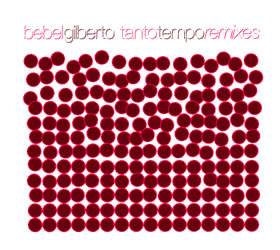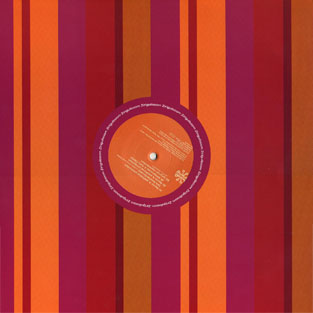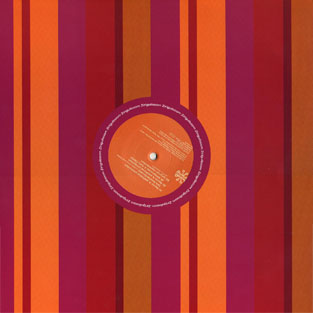
Bebel's self-titled second album came out in 2004 and further consolidated her status. It showed a more mature, more confident Bebel, an artist in full bloom whose songwriting skills and inimitable, magical voice had ascended to new heights. The album was received with enthusiasm, and earned a string of awards and nominations, including a Mobo Award (UK), an Adlib Award (Japan, nominations for a Grammy and for a BBC Radio Award for World Music, etc.
To record this album, Bebel enlisted the talents of producer Marius de Vries (Rufus Wainwright, Björk etc). Several distinguished guest musicians and co-producers also worked on the album, including Carlinhos Brown, Brazilian master percussionist Marcos Suzano, Guy Sigsworth and Pascal Gabriel, not to mention a dozen other musicians and a full string section, who participated to the various recording sessions which took place in Rio de Janeiro, Salvador de Bahia, New York, and London. Paradoxically, these songs (most of which were written or co-written by Bebel) sound even more intimate than "Tanto Tempo", and Bebel's unique voice has never sounded so warm and soulful.
From the original press release:
Bebel Gilberto. The name sounds like a caress and this time around our Brazilian sweetheart’s voice is dreamier, more soothing - indeed, more soulful - than ever. Her songs are still finely crafted, still aimed straight at the heart; most are now written or co-written by the artist herself. There are beats, of course, and bossa nova, and an abundance of laid back cool. She still straddles the club floor/traditional divide with kitten-heeled panache. But this proudly self-titled new album has something else as well. An increased confidence, perhaps. A maturity, a curiosity, born of experience - of ignoring expectations, then surpassing them. Bebel Gilberto is no longer the princess of the Brazilian music boom. She is, unequivocally, its queen.
"I want to show the world that Brazilian music isn't just 'The Girl From Ipanema'," she once declared. She has done all that, and more. Released in 2000 by European independent label Crammed on its Ziriguiboom imprint, her debut album Tanto Tempo was nothing short of a phenomenon, a critically acclaimed exercise in subtle sophistication that remains one of the most globally successful albums of Brazilian music ever. It explored a culture, redefined a genre, proved Bebel a mistress of cool sounds and artful collaborations. Bill Clinton named it a favourite. Everyone from David Bowie and Janet Jackson to director Pedro Almodóvar came out as fans. Designer Narciso Rodriguez called her his muse. Photographer Mario Testino shot her portrait. The ensuing re-mix album reinforced her reputation as an artist willing to take risks.
As the daughter of João Gilberto, the creator of bossa nova - and a man known in Brazil as, simply, The Legend - Bebel was always going to have to work hard at forging a solo career. Her mother, Miúcha, is a well known singer. Her uncle Chico Buarque is one of Brazil's first pop stars. Brazilians expected great things of Bebel, who made her recording debut at the age of seven on one of her mother's records, and appeared live at New York's Carnegie Hall (alongside Miúcha and jazz legend Stan Getz) at the age of nine. "In Brazil it was like, 'Okay, the girl has talent, but what is she doing?'," she says. "I realised I had to get out."
In 1991 she left Rio for her birthplace, New York. "I gave away everything," she remembers. "I left with all my possessions in one box." She waitressed, baby sat, posed as an artists' model. She fine-tuned her musical vision, worked with the likes of David Byrne, Thievery Corporation and Deee-Lite's Towa Tei, brought the bossa nova sound to the metropolis' dance floors, and created Tanto Tempo with the late lamented production genius Suba. The detractors started muttering when the second, 'difficult' album wasn't forthcoming. Maybe she couldn't do it again, they hissed. Maybe she was too frightened to try. Bebel maintained a dignified silence, and then went and made a second album that is, however remarkably, even better.
Helmed by producer and keyboardist Marius de Vries (Björk/Annie Lennox/ Madonna), Bebel Gilberto was recorded in New York, London, Rio de Janeiro and Salvador, the capital of Bahia in Brazil's musically fecund northeast region. Classic as well as cutting edge, it is the perfect compliment to the wiser, savvier Bebel. "The new album reflects the years I have spent working and travelling since Tanto Tempo," she offers. "I think that I've developed as a songwriter, despite not having the vocabulary in English that I do in Portuguese. I'm really excited," she adds with a grin, "because this is like a continuation of the new Bebel, the one that was born four years ago inside myself."
Still, Bebel is a little bit nervous. "The problem with any second album is, are people are going to like it as much as the first? But while I tried to recapture the magical feeling of Tanto Tempo, I had to move to a more grown up stage." She and de Vries decided on predominantly acoustic instrumentation. Understated flourishes electronic swirls here, piano, flute, trombone there - help provide a framework for her oh-so intimate voice. The opening track, 'Baby', is a cover of a song by Brazilian icon Caetano Veloso with tongue-in-cheek English lyrics provided by Brazilian psycho-delics Os Mutantes ("They have the kind of humour I have. I thought it would be nice to show that side of my personality.") It is followed by 'Simplesmente', a swoonsome collaboration with keyboardist and friend Didi Gutman ("He's Argentinian, so he really understands how Brazilian music works."), and 'Aganjú', a rhythmic paean to the divinity Xangô, written with Bahia-based multi-instrumentalist Carlinhos Brown and featuring Miúcha on backing vocals.
Each track feels considered, more complete. There's the gorgeous 'All Around', a slow, sad bossa nova performed with Japanese guitarist Masaharu Shimizu. 'Do you know how it is without anyone?', croons Bebel, wistfully. 'River Song' takes the lush Brazilian landscape as its theme: "In Rio you have mountains, waterfalls, the sea all around. This is the city I was raised in." The quirky 'Jabuticaba' tells of a fruit that grows in the trunk of a tree; Carlinhos Brown dresses up the melody with tabla, tamborim and Indian banjo. A contrast, then, to the Portuguese-language 'Cada Beijo', co-written with keyboardist Guy Sigsworth and all the more dramatic for its stark simplicity. "I wanted to leave in the rawness, the spirit I had when I wrote it," Bebel says.
Then there 'Winter', another collaboration with Gutman and de Vries, a sunny take on love in the coldest season; the trio come together yet again on the beautiful lullaby 'Next To You' ("It's about the happiness that comes from being to whoever you are dreaming about."). On the pathos-filled 'Céu Distante', a song of ever-changing skies and hemispheres, Bebel teams up with multi-instrumentalist and arranger Pascal Gabriel. "You go to so many different countries. You look up and ask, 'Why is the sky so different? Where is my sky? The sky of South America?'"
Bebel's songs often feel like invitations to dance on clouds. Take the sensual 'Every Day You've Been Away', written especially for the chanteuse by two musicians with similarly impressive pedigrees: Daniel Jobim, grandson of Tom, and Pedro Baby Gomes, son of the singer Baby Consuelo and guitarist Pepeu Gomes. Both insisted that Bebel, and only Bebel, should sing it. "It was so deep and simple," she smiles. "I had to." Though the track 'O Caminho' bears her sole song writing credit, she nearly didn't record it at all. Bebel originally wrote it for Cesaria Evora, the Cape Verdean legend, but became too attached to give it away. "The inspiration came from my heart," she says of the track, whose poignancy is augmented by exquisite piano from yet another legend, João Donato.
Quite some team, then. Just as Bebel Gilberto is quite some album. Its creator might dream of Ipanema, of sashaying along the sand at night, but her music is global, far-reaching. The girl has left Rio and come back via other cities, places, times. Bebel Gilberto, our sultry singing queen, is now a fully-fledged woman of the world.














